Introduction
In the intricate landscape of real estate transactions, understanding the nuances of a Preliminary Title Report is paramount for both buyers and sellers. This essential document not only outlines the current state of a property's title but also serves as a safeguard against potential legal complications that could arise during the transfer process. With its comprehensive analysis of ownership history, liens, encumbrances, and other critical factors, a Preliminary Title Report provides invaluable insights that can significantly influence decision-making.
As the real estate market continues to evolve, the importance of these reports cannot be overstated; they are a cornerstone of due diligence, risk mitigation, and ultimately, successful property transactions.
Defining the Preliminary Title Report: Key Concepts and Components
A Preliminary Title Report is a document created by a title company or a lawyer that describes the current condition of ownership of a piece of real estate. It functions as an essential instrument in realty dealings, offering a glimpse of the asset's ownership background and any possible concerns that might impact the transfer of ownership. Key elements of a preliminary ownership document include:
- Description of the Asset: A detailed legal description of the asset, including boundaries and any relevant easements.
- Current Ownership: Information about the present owner of the asset and any previous owners.
- Liens and Encumbrances: Any claims against the asset, such as mortgages or tax liens, that could affect ownership.
- Judgments: Any legal judgments against the asset owner that may impact the ownership.
- Exceptions and Exclusions: Specific items that are not covered by the ownership insurance policy, which may include certain easements or restrictions.
Understanding these components is vital for both buyers and sellers, as it helps identify any that could arise during the transaction process.
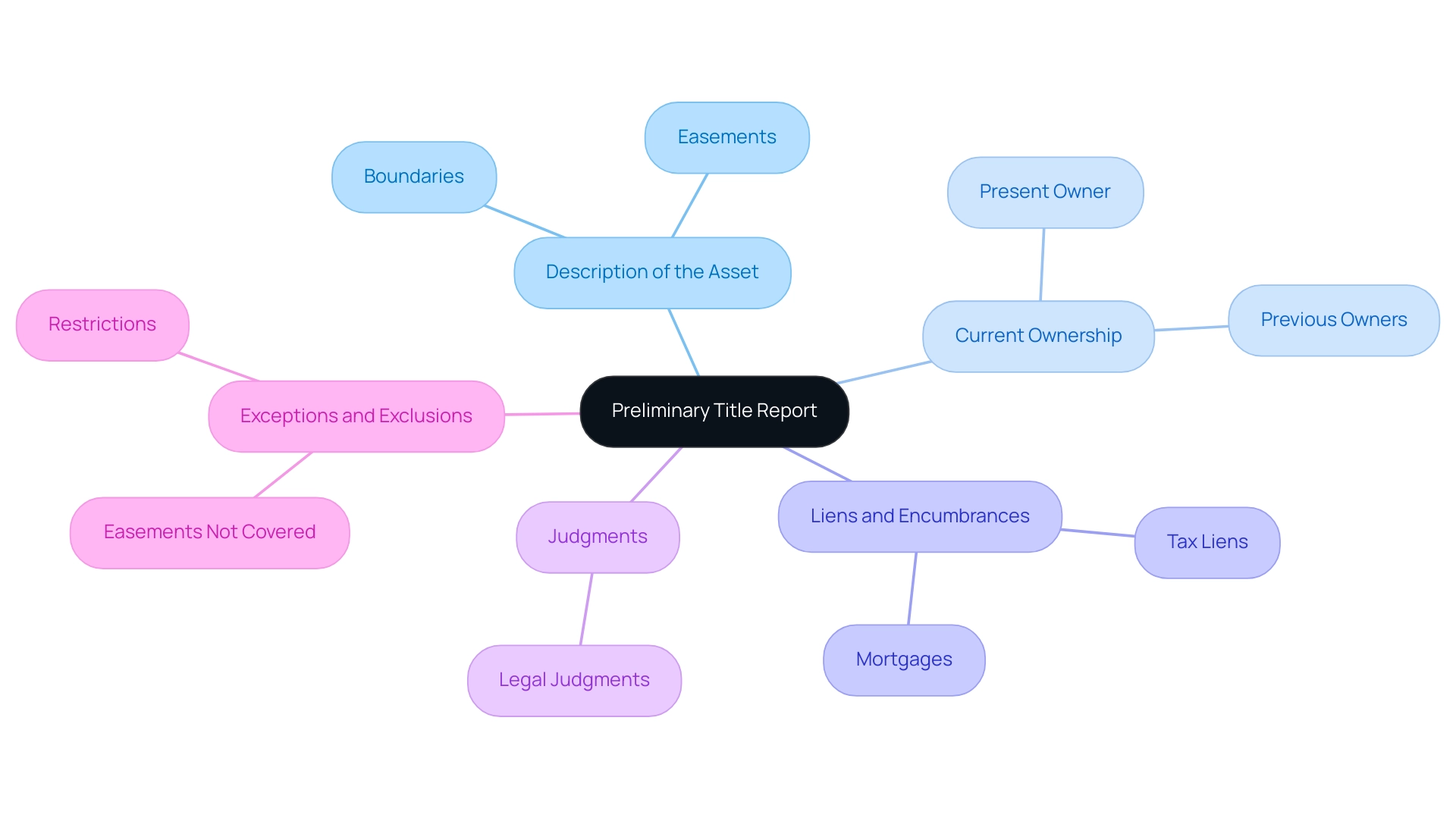
The Importance of Preliminary Title Reports in Real Estate Transactions
Initial documentation is vital in property transactions, providing crucial insights that facilitate informed decision-making. Consulting a real estate specialist can further clarify the property's ownership and streamline the transaction. Here are several key reasons why these documents are essential:
- Risk Mitigation: By uncovering potential issues such as liens or disputes, preliminary ownership documents enable buyers and sellers to address concerns before closing, significantly reducing the likelihood of future legal complications. Statistics indicate that roughly 25% of all property transactions face documentation problems that might result in legal conflicts. Acquiring an initial document is essential for any real estate transaction as it offers crucial details regarding the property's ownership and aids in recognizing significant risks, ensuring informed choices and facilitating a more seamless closing procedure for both purchasers and vendors.
- Streamlining the Closing Procedure: Grasping the ownership status beforehand can accelerate the closing process. Parties can resolve issues upfront, avoiding delays that could arise from ownership disputes. In Texas, either the seller or the lender may be accountable for requesting a preliminary document, emphasizing the significance of beginning early and examining the document thoroughly. Recent trends indicate that more transactions are utilizing technology to acquire these documents quicker, which further boosts efficiency.
- Facilitating Insurance Coverage: are often a prerequisite for obtaining insurance coverage, which safeguards buyers and lenders against losses from ownership defects. This process enhances due diligence for real property professionals, ensuring compliance with legal and regulatory requirements. A case study from a recent transaction demonstrates that a purchaser who acquired a preliminary document was able to uncover a concealed lien, which was addressed prior to closing, thus averting possible financial loss.
- Enhancing Due Diligence: For real property professionals, having a preliminary document is essential to performing comprehensive due diligence. This guarantees adherence to all legal and regulatory standards, ultimately resulting in a more efficient transaction.
Through his commitment and strategic approach, Zach Shelley continues to make a significant impact in the realty sector, providing homeowners with alternative pathways to navigate their property transactions. His insights further emphasize the significance of initial ownership documents in reducing risks.
In summary, initial ownership documents are essential in property transactions, offering clarity and confidence to all parties involved. They play a crucial role in risk reduction, streamlining the closing process, facilitating insurance, and enhancing due diligence, thereby contributing to the overall success of property transactions.
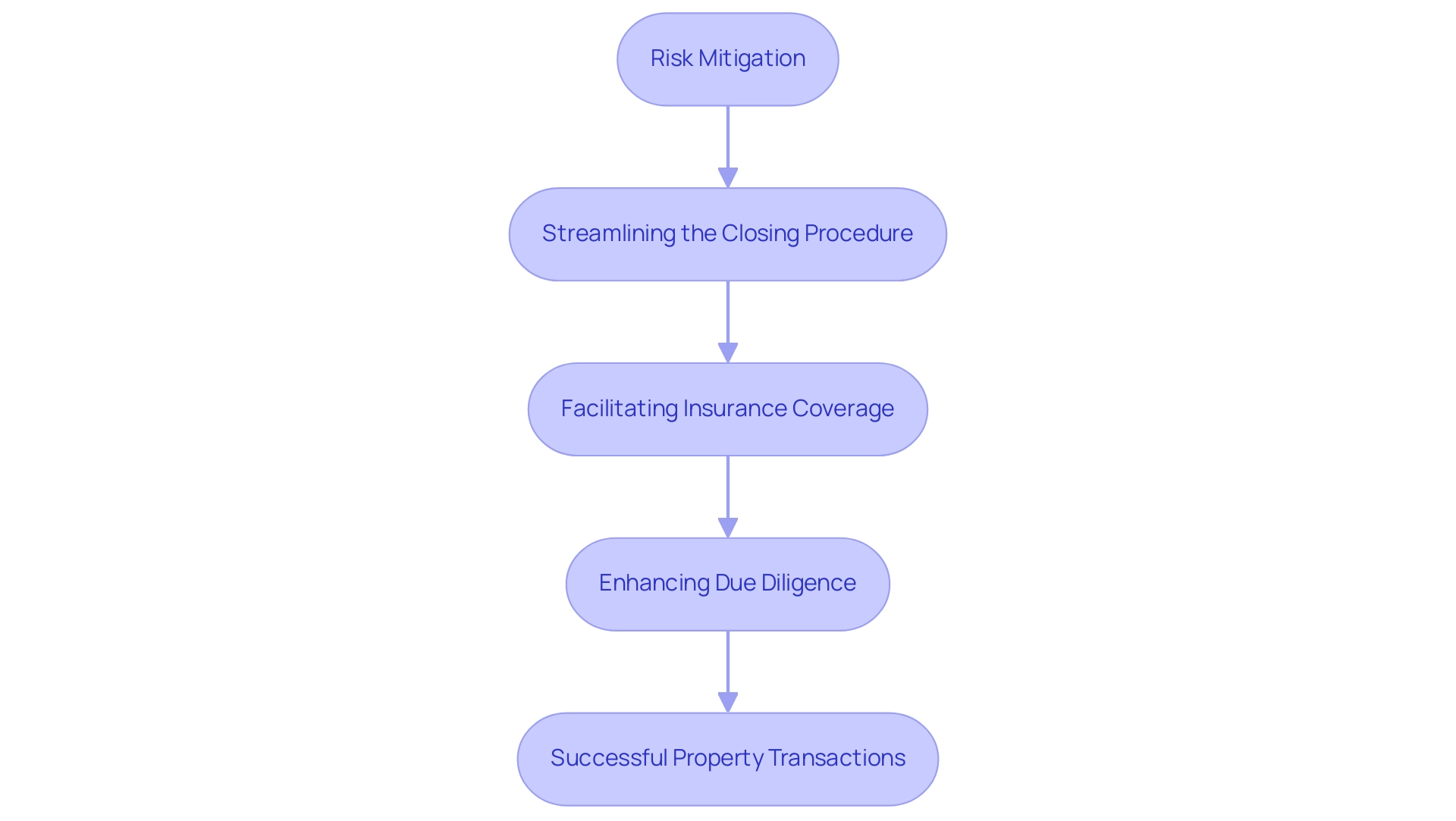
Common Issues Identified in Preliminary Title Reports
Initial property reports are essential in spotting problems that can complicate realty transactions. Some of the most common issues include:
- Liens: Unresolved liens from previous owners can obstruct property transfer, necessitating negotiation or full payment before closing. Recently, a lien priority dispute was successfully settled, recovering several hundred thousand dollars for the client, illustrating the significant impact liens can have on transactions. In fact, studies indicate that approximately 30% of real property transactions are influenced by liens, underscoring the importance of thorough title research.
- Boundary Disputes: Discrepancies in land descriptions can lead to conflicts with neighboring landowners. For instance, in Case Study No. 7, a buyer discovered a lack of utility easements for a swimming pool that the seller had failed to disclose, highlighting the importance of thorough investigation. As stated by real property expert Jane Doe, "Understanding boundary lines is crucial to avoid costly disputes in the future."
- Easements: Existing easements can restrict land use, affecting the buyer's plans and the value of the site. Expert opinions emphasize the need for careful review of easement documentation to avoid future disputes. According to John Smith, a seasoned property lawyer, "Failing to identify easements can lead to significant financial losses and operational challenges for new property owners."
- Errors in Public Records: Inaccuracies in public records can cause confusion and potential legal issues due to incorrect ownership information. Addressing these errors promptly is crucial for a smooth transaction. As noted by real property professional Emily Johnson, "Timely corrections of public record errors can save buyers from future headaches."
Real property experts must be vigilant about these issues to proactively seek resolutions. This approach not only ensures a but also safeguards the interests of all parties involved.
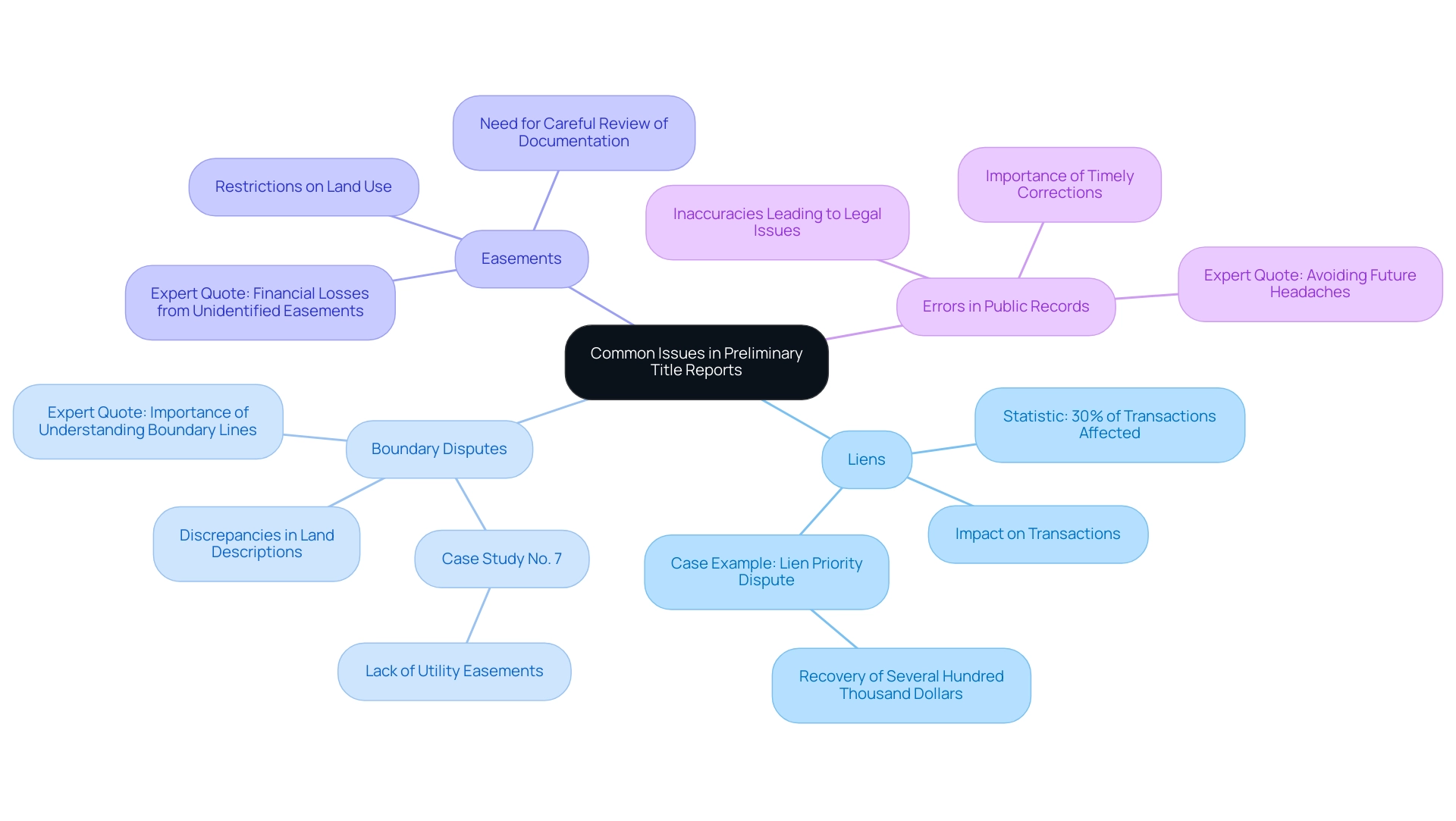
The Process of Obtaining a Preliminary Title Report
Acquiring a preliminary document report involves several key steps:
- Engaging a Title Firm or Attorney: The process typically begins with hiring a reputable firm or real estate lawyer who specializes in research of . Utilizing advanced tools like Parse AI can enhance this process by automating document processing and title research, leading to increased accuracy and efficiency.
- Providing Real Estate Information: The client must provide essential details about the real estate, including its legal description, address, and any known ownership history. This information can be efficiently processed through Parse AI's interactive labeling features, which allow for customized data extraction tailored to specific characteristics, ensuring that all relevant details are captured.
- Conducting Ownership Searches: The company will perform a comprehensive search of public records to gather information about the property’s history, including any liens, encumbrances, or legal issues. With Parse AI's OCR technology, these searches can be expedited, leveraging machine learning to extract critical information from document headers swiftly and accurately, thereby reducing the time spent on manual searches.
- Assessing the Document: After the document is created, the firm will examine it with the client, emphasizing any possible concerns and offering suggestions for resolution. By utilizing Parse AI, the assessment review process can be streamlined, ensuring all vital details are easily accessible for informed decision-making.
By following these steps and integrating advanced solutions like Parse AI, real estate professionals can ensure they receive accurate and timely preliminary documents, paving the way for successful transactions. Additionally, Harbinger Land's expertise in mineral leasing and acquisitions can provide valuable insights during this process, further enhancing the overall effectiveness of ownership research.
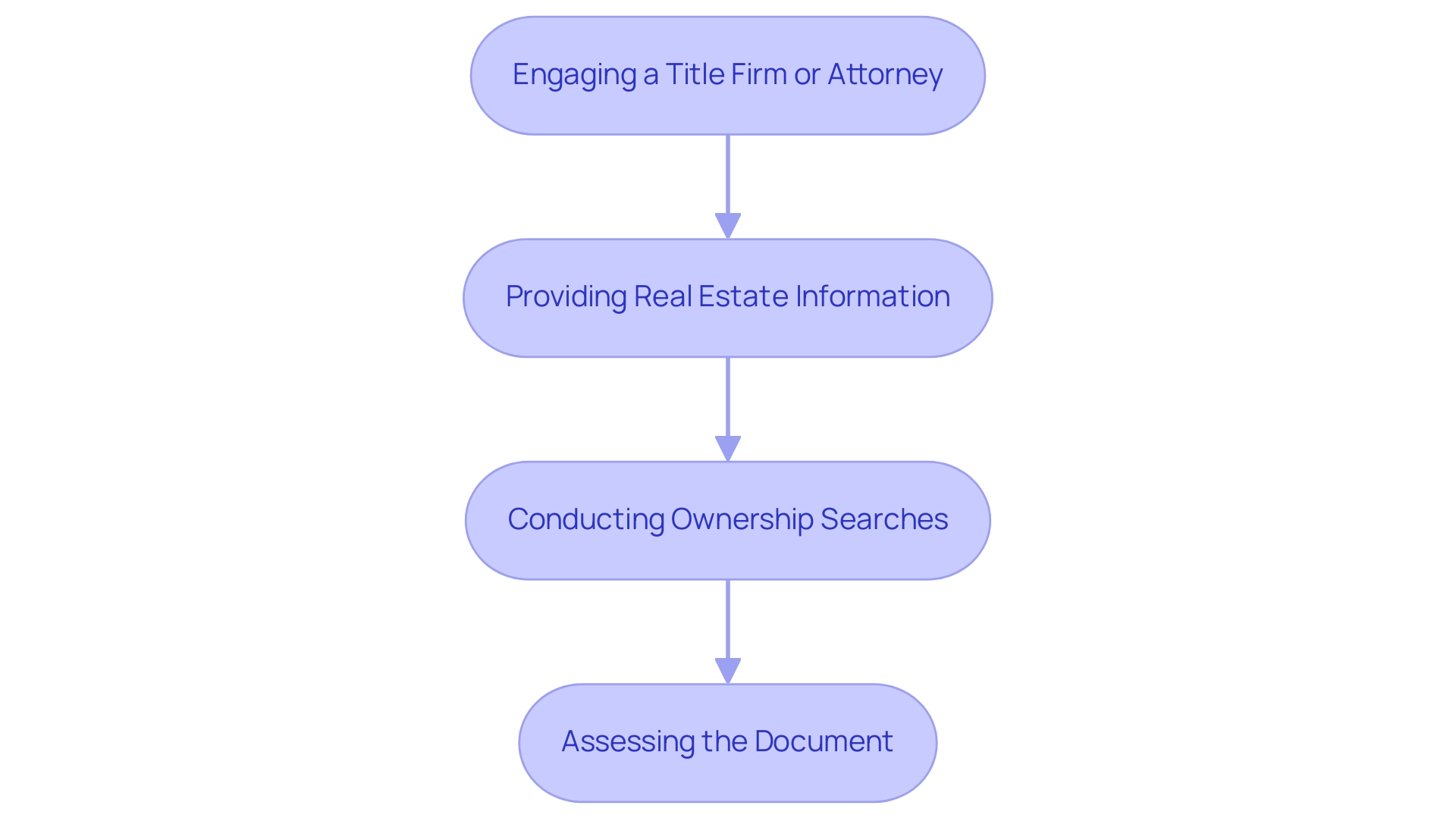
Best Practices for Interpreting Preliminary Title Reports
Interpreting a preliminary document necessitates careful attention to detail and an . Here are some best practices to consider:
- Familiarize with Legal Terms: Understanding common legal terms and phrases used in title reports will help in deciphering the information accurately.
- Focus on Key Components: Pay special attention to sections detailing liens, encumbrances, and exceptions, as these can significantly impact the transaction.
- Consult with Experts: If there are any unclear elements, consulting with a title company or legal expert can provide clarity and ensure proper interpretation.
- Document Findings: Keep a record of any issues identified in the report, along with notes on how they were resolved, to streamline future transactions.
By following these best practices, real estate professionals can effectively navigate the complexities of preliminary title reports, ensuring they are well-informed throughout the transaction process.
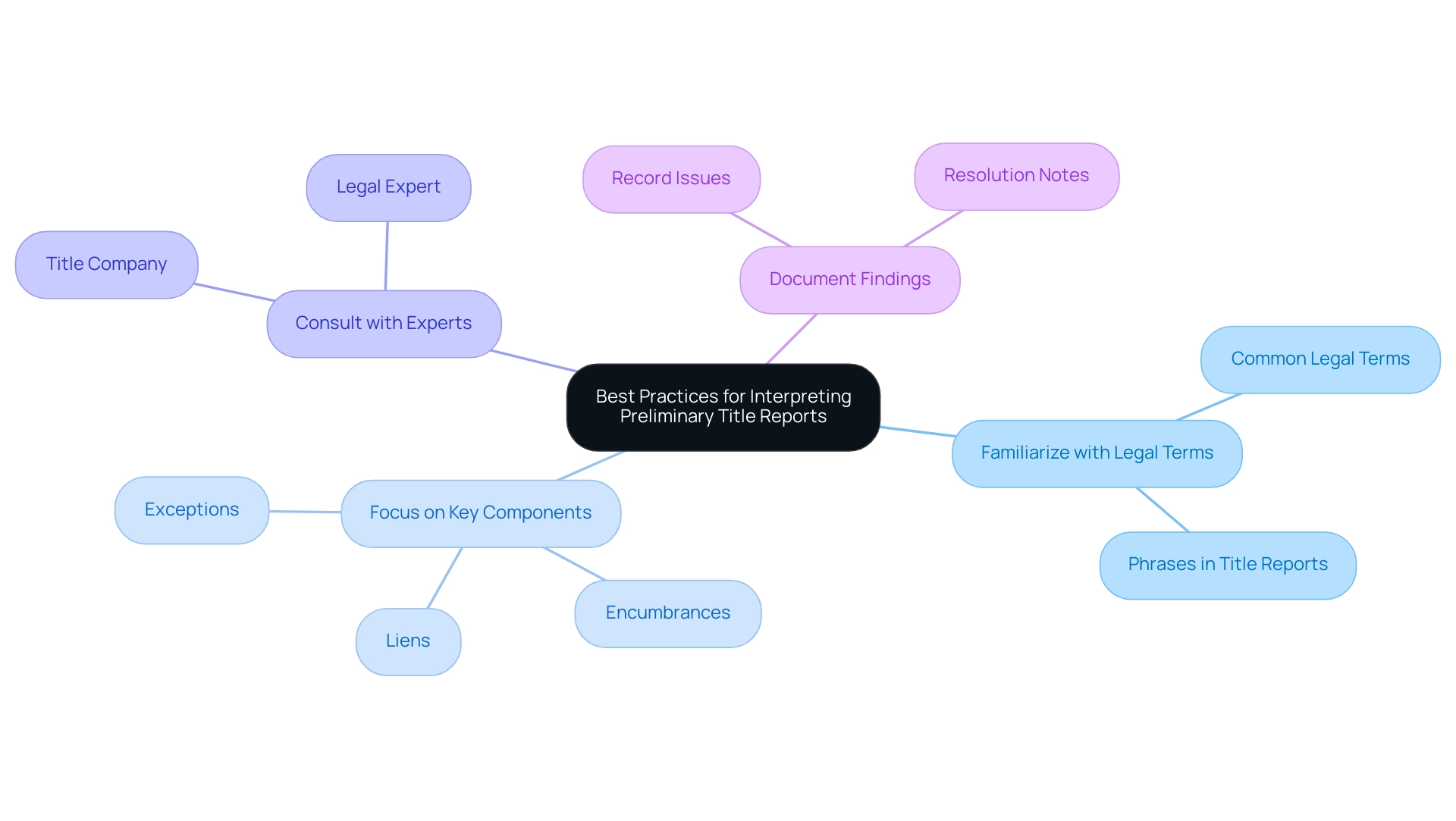
Conclusion
Preliminary Title Reports are essential documents that play a critical role in the real estate transaction process. They provide a comprehensive overview of a property's title, including its ownership history, liens, encumbrances, and any potential legal issues that may arise. By understanding the key components of these reports, both buyers and sellers can mitigate risks and make informed decisions.
The importance of Preliminary Title Reports cannot be overstated. They not only help in identifying potential issues early on—such as liens or boundary disputes—but also facilitate a smoother closing process and assist in obtaining title insurance. By ensuring that all parties have a clear understanding of the property's title status, these reports contribute significantly to the overall success of real estate transactions.
Common issues identified in these reports, such as unresolved liens or discrepancies in public records, highlight the necessity for thorough title research. Engaging with experienced professionals and utilizing advanced technology can further enhance the accuracy and efficiency of obtaining and interpreting Preliminary Title Reports.
Ultimately, a well-executed Preliminary Title Report serves as a safeguard against future complications, ensuring that real estate transactions proceed seamlessly. The insights gained from these reports are invaluable, reinforcing the importance of due diligence in the ever-evolving landscape of real estate. By prioritizing the review and understanding of Preliminary Title Reports, stakeholders can navigate property transactions with confidence and clarity.
Frequently Asked Questions
What is a Preliminary Title Report?
A Preliminary Title Report is a document created by a title company or lawyer that outlines the current condition of ownership of a piece of real estate, including the asset's ownership history and potential concerns affecting the transfer of ownership.
What key elements are included in a Preliminary Title Report?
Key elements include a detailed legal description of the asset, current ownership information, any liens and encumbrances, legal judgments against the owner, and exceptions or exclusions from the ownership insurance policy.
Why are Preliminary Title Reports important in real estate transactions?
They help identify potential issues that could complicate transactions, mitigate risks by uncovering liens or disputes, streamline the closing process, facilitate insurance coverage, and enhance due diligence for property professionals.
What common issues can be identified through Preliminary Title Reports?
Common issues include unresolved liens, boundary disputes, existing easements, and errors in public records, all of which can complicate property transfers.
What are the steps to acquire a Preliminary Title Report?
The steps include engaging a title firm or attorney, providing real estate information, conducting ownership searches, and assessing the document with the firm to address any concerns.
How can technology enhance the process of obtaining a Preliminary Title Report?
Utilizing advanced tools like Parse AI can automate document processing and title research, improving accuracy and efficiency in gathering ownership information.
What best practices should be followed when interpreting a Preliminary Title Report?
Best practices include familiarizing oneself with legal terms, focusing on key components like liens and encumbrances, consulting with experts for clarification, and documenting any identified issues and their resolutions.




